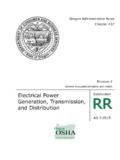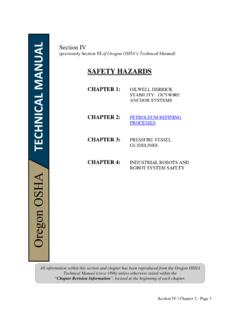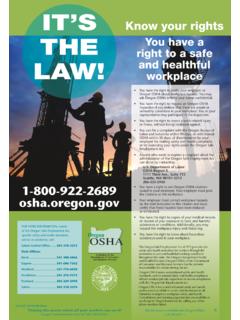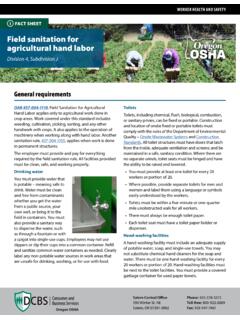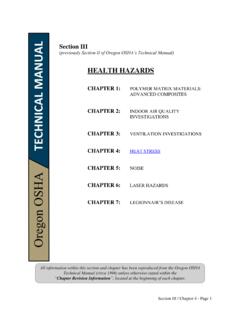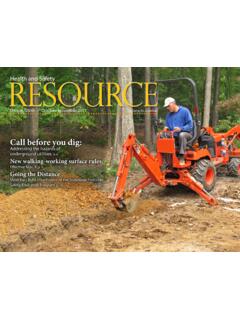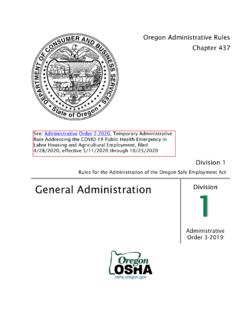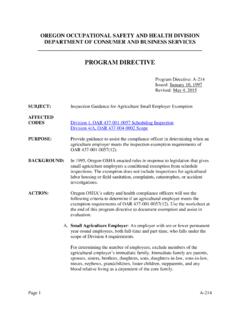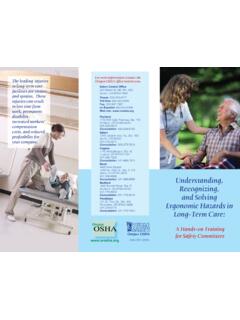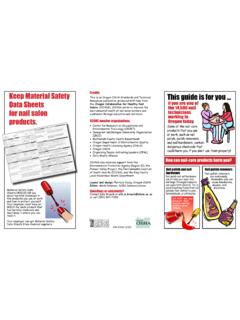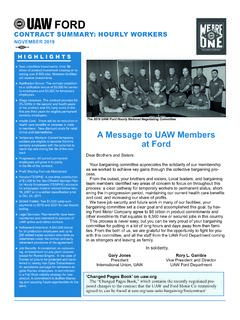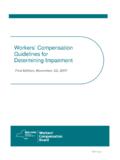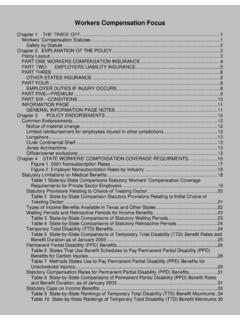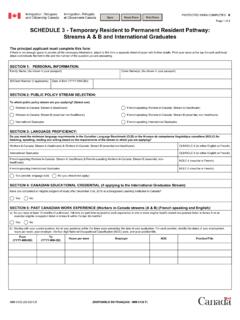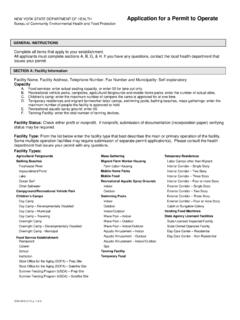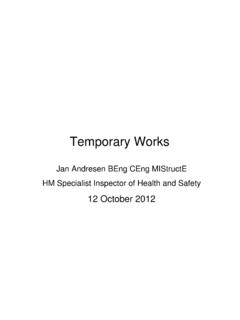Transcription of Division 1, 437-001-0744, Rule Addressing COVID-19 ...
1 General Administration 1 Oregon Occupational Safety and Health Division Oregon Administrative Rules AO 14-2021 Division 1 437-001-0744 Div. 1 - Page 1 437-001-0744 (1)(c)(C) 437-001-0744 Rule Addressing COVID-19 Workplace Risks .. 1 Appendix A - Mandatory Workplace Guidance for Industry-Specific and Activity-Specific Situations .. 27 437-001-0744 Rule Addressing COVID-19 Workplace Risks Note: Oregon OSHA s temporary rule Addressing COVID-19 in the workplace expired May 4, 2021, 180 days after its adoption. Under the Oregon Administrative Procedures Act, a temporary rule cannot be renewed or extended beyond 180 days. Therefore, in order to extend protections for workers against COVID-19 , which remains a significant concern, Oregon OSHA adopted this rule following the normal process for permanent rulemaking. However, the purpose of this rule is to address the COVID-19 pandemic in Oregon workplaces.
2 Oregon OSHA will repeal the rule when it is no longer necessary to address that pandemic. Because it is not possible to assign a specific time for that decision, Oregon OSHA will consult with the Oregon OSHA Partnership Committee, the Oregon Health Authority, the two Infectious Disease Rulemaking Advisory Committees, and other stakeholders as circumstances change to determine when all or part of the rule can be appropriately repealed. The first of these discussions took place in June 2021, and they will continue every month until the rule has been repealed. In making determinations about when to repeal all or part of the rule, Oregon OSHA and its stakeholders will consider indicators and other information such as (but not limited to) Executive Orders issued by the Governor, guidance issued by the Oregon Health Authority and the Centers for Disease Control, infection rates (including the rate of spread of COVID-19 variants), test positivity rates, and vaccination rates, as well as indicators of severity such as hospitalizations and fatalities.
3 (1) Scope and Application (a) This rule applies to all employees working in places of employment subject to Oregon OSHA s jurisdiction and exposed to one or more other individuals outside their household. For clarity and ease of reference, this rule refers to COVID-19 when describing exposures or potential exposures to SARS-CoV-2, the virus that causes Coronavirus Disease 2019. (b) The requirements of section (3) of this rule are applicable to all workplaces. (c) In addition to the requirements of section (3), the requirements of section (4) of this rule are applicable to all exceptional risk workplaces. For purposes of this rule, workplaces at exceptional risk, include any setting (whether a healthcare setting or not) where an employee (including temporary and part-time employees) performs one or any combination of the following job duties: (A) Direct patient care; (B) Environmental decontamination services in a healthcare setting; (C) Aerosol-generating healthcare or postmortem procedures; 1 General Administration Division 1 AO 14-2021 Oregon Administrative Rules Oregon Occupational Safety and Health Division 437-001-0744 (1)(c)(D) Div.
4 1 - Page 2 437-001-0744 (2)(c) (D) Direct client service in residential care or assisted living facilities; (E) Emergency first responder activities; (F) Personal care activities that involve very close contact with an individual, such as toileting or bathing; or (G) Handling, packaging, cleaning, processing, or transporting human remains or human tissue specimens or laboratory cultures collected from an individual known or suspected to be infected with COVID-19 . Note: Exceptional risk does not include workers of other departments or job duties outside the scope and underlying definitions of (1)(c) of this rule. For example, employees in the accounting department at a hospital would be covered by the requirements applicable to all workplaces, while other workers at the same hospital who actually perform any of those job operations listed under (1)(c), such as direct patient care, would be subject to the supplementary requirements for workplaces at exceptional risk in addition to the requirements for all workplaces.
5 (2) Definitions (a) Aerosol-generating healthcare or postmortem procedure means a medical, dental, or postmortem procedure on human patients or remains that is likely to result in exposure to small droplet nuclei in high concentration, presenting a risk for airborne transmission of COVID-19 . (b) Common areas means building lobbies, reception areas, waiting rooms, restrooms, break rooms, eating areas, smoking areas, locker rooms, bathing areas, transit lounges, conference rooms, or other locations indoors or outdoors that multiple individuals may use or congregate that employers operate or control. (c) Decontamination of filtering facepiece respirators (FFR) means a process approved by the Food and Drug Administration (FDA) that reduces the number of pathogens, does not negatively affect the fit or filtration performance of the FFR, and presents no residual chemical hazard.
6 General Administration 1 Oregon Occupational Safety and Health Division Oregon Administrative Rules AO 14-2021 Division 1 437-001-0744 (2)(d) Div. 1 - Page 3 437-001-0744 (2)(g) (d) Direct patient care means any employee job duties that include direct physical contact with a patient during the delivery of healthcare services. A worker performs direct patient care under the authority granted by a license or certification issued by federal, state, or local entities to provide healthcare services within the scope of practice. Workers may be providing direct patient care under their own licensure or certification, or may be providing care under the supervision of a licensed or certified worker . Workers involved in direct patient care include, but are not limited to, physicians, physician assistants, nurses, nurse practitioners, certified nursing aide, medical technologists, phlebotomists, respiratory therapists, dentists, dental hygienists, physical or occupational therapists, chiropractors, and other workers who otherwise provide in-person healthcare services.
7 Direct patient care does not include customer service activities provided in retail settings that have embedded healthcare offices, such as retail pharmacies. (e) Emergency first responder activities means those job duties that require an employee to be able to arrive first and provide assistance at the scene of an emergency, such as an accident, fire, or natural disaster. First responders include but are not limited to law enforcement officers, firefighters, emergency medical technicians, and paramedics. Emergency first responder activities under this rule do not include tasks where only first aid is provided in accordance with OAR 437-002-0161. (f) Employee means any individual, including a minor whether lawfully or unlawfully employed, who engages to furnish services for a remuneration, financial or otherwise, subject to the direction and control of an employer; any salaried, elected and appointed official of the state, state agencies, counties, cities, school districts and other public corporations; and any individual who is provided with workers compensation coverage as a subject worker pursuant to ORS chapter 656, whether by operation of law or election.
8 (g) Employer means any person who has one or more employees, any sole proprietor or member of a partnership who elects workers compensation coverage, or any corporation in relation to the exposure of its corporate officers except for corporations without workers compensation coverage under ORS and whose only employee is the sole owner of the corporation, or any successor or assignee of an employer as described in OAR 437-001-0015. 1 General Administration Division 1 AO 14-2021 Oregon Administrative Rules Oregon Occupational Safety and Health Division 437-001-0744 (2)(h) Div. 1 - Page 4 437-001-0744 (2)(k) (h) Employment, Place of has the meaning provided in OAR 437-001-0015 and excludes any place where the only employment involves workers not covered by workers compensation and employed in or around a private home, as well as any corporate farm where the only employment involves the farm s family members.
9 Note: The employment of home care and home health-care workers by a resident of the home in which they work is not subject to workers compensation (even though the employees receive such coverage through the Home Care Commission) and therefore their employment is not covered by Oregon OSHA. Such workers who are employed by private home health or in-home care agencies are subject to workers compensation and therefore their employment is covered by Oregon OSHA. Private homes, such as adult foster care homes, where the only employment is for the care and comfort of the residents are also not required to obtain workers compensation and are therefore not subject to Oregon OSHA unless the employer has opted to provide workers compensation coverage under ORS (i) Environmental decontamination services means the work performed by janitorial, custodial, maintenance, or similar employees who are responsible for cleaning equipment, surfaces, or other items in direct patient care healthcare settings.
10 This includes routine and non-routine cleaning or disinfecting of high-touch surfaces as defined by this rule, equipment, or procedural tools that are used in patient care areas in healthcare settings, including those settings in which aerosol-generating procedures are performed. (j) Face covering means a cloth, polypropylene, paper or other covering that covers the nose and the mouth and that rests snugly above the nose, below the mouth, and on the sides of the face. Coverings that incorporate a valve that is designed to facilitate easy exhalation or mesh masks or other covers with openings, holes, visible gaps in the design or material, or vents are not appropriate face coverings because they allow droplets to be released from the covering. (k) Face shield means a transparent plastic shield that covers the wearer s forehead, extends below the chin, and wraps around the sides of the face.
